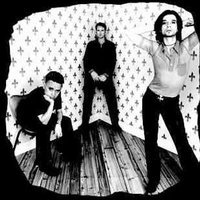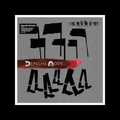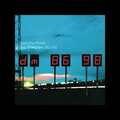With a new album in the racks – not to mention a gig that’ll go down in Glasgow lore – we catch up with founding member Andrew Fletcher to plot just how a mere pop band from the early 80s became something approaching the iconic
“We’re one of the most popular bands in the world,” says Andrew Fletcher, matter-of-fact, chatting to The Skinny down the phone.
So; what’s the secret? we’ll ask Fletch, a little later on. Is there a secret?
Going Backwards
Rewind. 25 Jun 1981, and tonight’s edition of Top of the Pops doesn’t stick too far in the memory. We’re still in the era where music on TV veers towards light entertainment, so there’s the West End showtune brushing shoulders with a deeply unfunny novelty single – and whilst the much-missed Kirsty MacColl makes an appearance, watching the scantily-clad Legs & Co perform a ropey, interpretive dance to Michael Jackson’s mawkish One Day in Your Life (the week’s biggest selling single) underlines the fear that we haven’t yet quite hit the future.
Still, there is a synth-pop act on this evening’s bill. Number 43 in the charts. Four young, geeky lads from the Essex badlands, hiding their Top of the Pops virginity behind a stage presence that doesn’t quite hang together.
New Life – the band’s second single – is a perfectly serviceable Vince Clarke composition; a little insubstantial, perhaps, its chord progression the equivalent of a Meccano starter’s pack, but this is pop music we’re talking about, not a meditation upon advanced tonality. Presenter Simon Bates – Radio 1’s resident morbid uncle – introduces them as De-pesh-ay Mode; a pronunciation faux pas that persists in BBC-land until at least the mid-80s. Three figures stand behind their catalogue synthesisers as if a little unsure at what they should be doing, whilst centre-stage, Dave Gahan sports hairspray overload, gyrating against the microphone stand as if performing on a cross-channel ferry during a gale. A little leather on display to suggest edginess – Gahan's trousers, Clarke’s jacket, Fletch resplendent in Old Compton Street headgear – but nothing about the footage hints at what was to come.
Fast forward. 26 Mar 2017, and to celebrate the release of Spirit – the band’s fourteenth studio album – they’re headlining the BBC 6Music Festival at Glasgow’s Barrowland Ballroom, multiple cameras capturing the gig for broadcast. Watching the playback, and it’s impossible for TV to convey the atmosphere; Depeche Mode don’t play gigs to 2,000 people (and we’ve fallen out with friends by blagging tickets) – the place crackles. Fizzes. The voltage of anticipation. Something very, very special is about to unfold. What’s the secret? Is there a secret?
Their on-stage entrance is low-key. Long-term touring members Christian Eigner and Peter Gordeno settle behind drumkit and keyboards respectively. Fletch takes his place at his own keyboard rig, where he’ll spend much of the gig with arms aloft like a middle manager whooping it up at a sales conference. Martin Gore – black nail varnish perfectly applied – strums the opening chords of Going Backwards (the first track on the new album), his guitar one of the many different varieties he’ll be wielding tonight. And then there’s Dave...
It’s fascinating to witness Gahan’s onstage persona, and in a strange way you can recognise its genesis from those early Top of the Pops episodes. Cuban heels and trademark waistcoat – all the better to flaunt those tattooed arms of his – he looks sharp, lean, lupine, grinding his hips in front of the drum riser. Then he turns, eyeing up the crowd with a boxer’s stare, and as he sings his opening line in that familiar, knotty baritone, the entire auditorium breaks out in goosebumps.
So Much Love
We catch up with Fletch a few days later, and it’s fair to say that he rather enjoyed Depeche Mode’s first Barrowland gig since 1984. “It was incredible. We played there in the early 80s and I remember it being amazing then. But the great thing is that we only had to play for an hour.
“That helps, because if you do the two-hour set you have to pace it completely differently – no-one can go crazy for two hours. But when you’re playing an hour’s set you can make it nice and punchy.”
Punchy being the key adjective – as So Much Love (also from Spirit) succeeds Going Backwards, Gahan’s expression slips towards a pugilistic grin; he has us on the ropes. He slinks. He struts. He stalks the stage like a charisma-loaded evangelical preacher from a Hollywood Western, snake of hip and already doused in perspiration. He’s been doing this act for years – cupping his hand to his ears whilst pivoting the microphone out towards the audience; shouting “C’mon” or “Oh Yeah” during the middle eight – and it isn’t a given that this should work; not only is Gahan in his mid-fifties (as indeed are Gore and Fletch) – not always a becoming age for this type of shtick – but even when he was younger his on-stage affectations always carried with them a sheen of naffness. It’s olde-time preacher crossed with holiday camp entertainer.
(When the concert was transmitted on BBC4, one social media wag even started playing Depeche Mode live bingo; ‘Dave does a camp hip wiggle.’ ‘Dave spins round and round.’ ‘Andy Fletcher wears sunglasses.’ ‘Martin Gore does his solo song.’ We nearly get a full house).
It isn’t a given that this should work – yet it most assuredly does. If anything, the gig’s intimacy – plus set length abbreviated to punchiness by the demands of broadcast media – amplifies this persona even further. Gahan looks as if he’s having the most fun it’s possible to have; this isn’t just infectious, but utterly hypnotic. A masterclass in crowd psychology – we chant, sing along (even to the new material, which despite being out for a handful of weeks is greeted like old friends), cheer, clap and holler, and all of it in unison, as one, without dissent. Every gig you’ll ever go to, there’ll always be at least one enclave where folk are gossiping or toying with their mobile phones – but this isn’t an option, here. 'There’s a fire in my veins,' Gahan confesses as So Much Love approaches its dénouement, coyly turning a forearm to the crowd as if expecting us to scan for track marks, and he has us – rapt.
David Gahan isn’t the Messiah. But an hour on-stage at the Barrowland Ballroom, and he could give him a run for his money.
Corrupt… A Pain That I'm Used To
Next, a track from 2009’s Sounds of the Universe, followed by the opening item on 2005’s Playing the Angel. Not that it can be straight-forward, chiselling a setlist from thirty-seven years’ worth of material. “There was a funny thing, before we went on, when all of us realised that we didn’t know the setlist.” Fletch recalls. “We all panicked; are we doing Enjoy the Silence or not?”
He chuckles at the oversight. “It was just one of those things, but there was a big rush where the crew had to re-print all the setlists until we finally got one. There’s this really sweaty dressing room, and it’s supposed to be really relaxed before you go on… but if you don’t get the thrill [of playing live] you should be retired.
“When you make an album, you’re not really sure how the material is going to convert to playing live,” he adds, referring to the setlist’s visits to Spirit. “But with this record, I think they’re converting very well.”
As he talks of the new LP, it quickly becomes apparent that it’s something he feels a great deal of affection towards. Recorded in New York and Santa Barbara and produced by Simian Mobile Disco’s James Ford, it uses Socialist Realism as one inspiration – a visual identity crafted by long-term collaborator Anton Corbijn. But it’s also an angry record, riddled with a political posturing demonstrative of collective unease at where the world appears headed; as with every album since Vince Clarke bailed at the tail-end of 1981, Martin Gore serves as primary songwriter, but his material segues with a trepidation that the rest of the band (not to mention much of the audience) are also experiencing in these unusual times.
“It was influenced by current affairs,” Fletch says of the album’s gestation, “but the events of two years ago – before Brexit and before Trump became President. We normally keep away from politics – or we use it ambiguously – but I think that Martin was so pissed off with the world he felt he had to write about what he was feeling.
“You have to remember that the American Presidential election started two years ago – that’s how long the election cycle is. So, when Trump announced his candidature…”
He tails off, all of us too-aware of how that particular story unfolded. “Brexit really pissed all of us of, if I’m honest. Syria was a big factor, and then you’ve got the French problem – the increasing prominence of Marine Le Pen.
“This populist trend that’s going on is right-wing, and we’re obviously left-of-centre. Not very left-of-centre,” he qualifies, as if conscious that, what with all that Soviet-era imagery, we’re about to denounce Depeche Mode as Marxist infiltrators. “But you can see how Martin was feeling.”
So how different was it working with James Ford, especially after the three-album stint with Ben Hillier on production duties?
“Ben’s a great producer, but maybe there was too much going on some of the time. With James, it’s quite minimalistic. Every sound in there is vital. He was fantastic. He is great at sound, at making decisions, and he’s very quick. Normally, when we record an album it usually takes around five sessions of three or four weeks. We finished this in three sessions – which was wonderful, as it meant we could have a couple of months off before rehearsals.” Cue laughter at the admission.
Does that mean that the trio had to up their game when working with someone new?
“Yeah, I think there’s always that element. And it’s not just James – it’s the programmers we work with… it’s everyone really – you do feel that you have to prove things. But it’s funny; after you make the album you just haven’t got a clue if it’s good or bad, because you’ve heard everything a thousand times. It’s not really until about six months later that you can actually turn around and say ‘Oh, it’s quite good, that one.’”
World in My Eyes… Cover Me
Back in the Barrowland, and the pressure continues to mount; by the time of World in My Eyes, Gahan, oily with sweat, looks like he should be spent. Yet with Gore temporarily behind his own keyboard stack, there’s even more space upon which to prowl. He gravitates to the lip of the stage, grabs his crotch, shouts out between lyrics, and at the song’s climax, he reaches out in cruciform pose before bowing theatrically in Gore’s direction. Showmanship. Magnetism. After Cover Me – another item from Spirit – he is spent, retreating to the wings and a few minutes of dressing room cooling off.
Gahan has to be considered an integral element of both the band’s success and its longevity… but that’s only going to explain a fraction of all those record sales.
The Depeche Mode story has been well-told. Entire library shelves devoted to the subject – of how Clarke, Gore and Fletcher, after playing in a succession of unsuccessful, short-lived bands in their native Basildon, became increasingly inspired by the burgeoning post-punk electronica scene, roping-in Gahan as frontman for their new venture after his open-mic spot Bowie impersonation piqued Clarke’s interest.
Signed to Daniel Miller’s Mute label, interest came quickly; New Life rose from 43 to an eventual chart position of 11 just over a year after forming. Follow-up Just Can’t Get Enough breached the top ten, as did debut album Speak & Spell.
There’s an element of vogue behind such a rapid rise to prominence, the underground inclinations and overt experimentation of late 70s synthesiser music becoming more mainstream as bands such as OMD and the Human League began bothering the charts – the introduction of pop into what became synth-pop (also of note – the hardware was becoming increasingly less expensive, enabling boys from Basildon to get their hands on kit that not that long previously would have been financially beyond them).
An element of vogue – the quartet came along at exactly the right time – but even with a swift tail-wind behind you, sustained success is dependent on talent, and in Vince Clarke, DM had a chief songwriter with acutely-developed pop chops.
Post-Speak & Spell, Clarke had huge success. But not with Depeche Mode. They’d be saying ‘yes’ to any publicity they could get back in the early years – miming on children’s TV, answering questions about their favourite colours in teenage magazines – and that wasn’t a direction he wanted to travel down. Throw in the occasional creative difference, and Clarke quit, first teaming up with local girl Alison Moyet as Yazoo, then attaining global success as the creative force behind Erasure.
To many bands, losing the component that defined their sound would have been terminal. But not DM. Step forward, Martin Gore.
Home
Clarke’s exit became Depeche Mode’s making. Which is not to denigrate Clarke’s songcraft – it’s simply the case that Gore’s musical parameters are configured differently, the scope wider, pulling the sound away from preconceptions behind synth-pop and towards an environment where collaborative experimentation segued with both music and lyrics of emotional transparency.
Gore writes songs about love, and death, and alienation. About self-loathing and self-respect, remorse and revolution, of pleasure and pain (and a top ten single – Master and Servant – overtly concerning itself with sadomasochistic sex). Above all, Gore’s material avoids pretentiousness – and it’s perhaps this element that connects so deeply with the fanbase; songs that people relate to, emotions they live by, fashioned in a language that’s implicitly understood.
Glasgow, and with Gahan taking a breather, Gore (and the latest reveal from his guitar collection) takes to the centre of the stage. It’s a switch made at every gig; not so much because Gahan gets knackered easily as Gore’s softer, lilting, melodic tenor is explicitly suited to DM’s more personal, introspective moments – it’s difficult to picture Gahan singing Somebody (from 1984’s Some Great Reward) or One Caress (from 1993's Songs of Faith and Devotion), for instance.
Home (alongside Barrel of a Gun, which we’ll also be treated to later) is one of the stand-outs on 1997’s somewhat under-rated Ultra LP. A song that exudes a desperate tenderness, leaning towards the beguiling (and with Gore denoting each lyric with the jut of his hand tonight, we’re compelled to sing along).
In particular, the pitch and carry of the song’s central riff comes with a lost, yearning, yet almost validatory quality. It’s in a major key, but context suggests it should be minor, which somehow adds to allure; as the song reaches its final notes, Gore conducts the crowd, encouraging us to maintain this two-bar riff in another exercise of mutually-inclusive affirmation (spoiler: the crowd needs little encouragement). Gahan reappears, embraces Gore, then he too gestures for us to continue.
“You know you’re on telly?” he smirks in our direction.
Where's the Revolution… Barrel of a Gun… Walking in My Shoes…
The inherent joy behind the well-compiled setlist (see also: the intelligently-sequenced long player). Anticipation and expectation closely manipulated, controlled, both starting point and termination pre-planned, then sublimely executed. And yes – Depeche Mode live has always been an event; you’d expect them to put on a show… but such a triple punch at this, Gahan back as aperture, is enough to turn even jaded hearts. Three singles (including Spirit’s headline track): biff, bang, pow.
“It’s been… an amazing dream come true,” Fletch admits as we discuss the band’s sustained cultural impact. “I always tell this story, but we had these accountants when we started to make a bit of money, and they drew up a plan – that we’d only last for two or three years. And yet we just kept getting more and more popular; we had to throw that plan out.
“But it’s been incredible, and even now… we seem to be more popular now than we’ve ever been. We’re not a big media band, and it’s never been our ambition to be the biggest band in the world – it’s just the way things have played out. I think being on Mute Records was a big help. We had offers in the beginning from major labels, and they promised us a lot of money, but instead we chose a man that was offering us no money.”
That’ll be the fabled Daniel Miller, who’s still a DM confident despite the band having been signed to Sony-owned Columbia since 2013’s Delta Machine.
“We liked the music on his label. And with Mute we were allowed to grow and mature. I think if we’d been on a major label they’d have milked us and we’d probably have finished; that was one of the best moves. Also, Daniel turned out to be completely trustworthy – and the nicest guy, as well.”
So; the big question. How have Depeche Mode maintained that distinct brand of relevance and reverence over so many years? What is the secret? Fletch will know…
“I really don’t know if there is a secret.”
Ah.
“I don’t know… all I can say is that we’re persistent. Good songs, and we’ve made ourselves into a good live band.
“I suppose that we’ve been outside the mainstream, almost doing our own thing. We think our music is quite melodic – it’s not just a noise. We’ve never really gone for the tabloid press, and that’s another Mute thing – we’ve always tried to avoid the tabloids. The big cult of celebrity – we’re musicians in one of the top bands in the world, but we’re not celebrities – that’s the important thing. We lead totally normal lives. I go to the pub, I go to the cinema, and I don’t get any hassle.”
Is he being a little coy? Possibly. Longevity has its own complications, and Dave Gahan’s early 90s battle with addiction certainly wasn’t played out in private – the tensions of the time seeing multi-instrumentalist (and Vince Clarke replacement) Alan Wilder quitting after more than a decade’s service.
Then again, you can hardly blame Fletch for not wanting to trade in ancient history (Gahan’s been clean for twenty-odd years). Instead, when he speaks it’s of coherence, and an implicit faith in what the Gore/Gahan/Fletcher axis represents after thirty-seven years and counting.
“We’re a democracy. If someone doesn’t want to do something then we won’t do it.
“Martin and Dave live in the US and I live here, but it doesn’t really affect our relationships. Me and Martin are very close. Dave is more like a brother to me – if that makes sense.” (It does; it’s a read between-the-lines moment that maybe hints at ups and downs). “But what makes bands better than solo artists is the electricity that’s generated. Sometimes a band can’t stand each other but that electricity makes for great music. It’s the same with Depeche Mode; we have moments where we don’t like each other, and moments when we love each other. It’s the electricity that’s generated between us all that produces the good music.
“At the moment, we’re working in four-year cycles, where we record an album, promote an album, then tour, after which we have a year-and-a-half off, to do side projects, or basically spend time with our families. If we had to go back to madness it would be awful.”
Personal Jesus… Enjoy the Silence
“The UK is the country we’ve had the most criticism from. The press have never really taken us seriously it seems… until this album.”
It’s a valid point. Fletch is on record as claiming Depeche Mode don’t receive the recognition they deserve from their home market.
“Well, we haven’t – there’s no doubt about that. The problem with Britain is that the press are always looking for the next big thing, and they forget about the last big thing. In America and Europe, they tend to be more loyal.
“The situation here is that you’ve got a guy like Ed Sheeran – it seems like every single person in the UK buys his album, and they don’t buy any other album. It’s just a terrible situation.
“Nothing against Ed Sheeran,” he adds, guiding The Skinny away from our ‘DM slams Sheeran’ headline. “It’s just very peculiar... but things easily change. The reviews in Britain for the album have been really positive. And as for the Glasgow thing…”
Yes; the Glasgow thing. A climax of Personal Jesus then Enjoy the Silence – because what else are they going to finish with? The two big ticket items, Gahan now in full-on Weimar cabaret pomp – jazz hands amidst the fortitude of riff.
Personal Jesus tonight is simply spine-tingling. Tight and robust, Gore adding counterpoint. But it’s also something more than that; something indefinable perhaps. Elusive, like the secret of band’s success. And well, Enjoy the Silence. Gahan doesn’t even bother with each chorus; he simply stands afore the crowd with raised arms, his microphone outstretched and a look of ecstasy across his features as the rest of the band flex their own musical muscles.
Teasing out reasons behind a band’s success is a fool’s errand. There’s too many variables in play – some obvious, others far less so. Perhaps, as Fletch suggests, the secret is little more than good songs, a good show and the resolution never to give in… all we can say is, whatever the secret, it’s power is intoxicating.
It’s the end of the gig. Dave kisses Martin on the cheek, then struts back to the centre of stage, pulling his waistcoat open to reveal a torso far too svelte for a chap his age. We head into the night, resigned to the knowledge that every gig we’ll ever attend will be an anti-climax, after this.
Delving in to the Back Catalogue
Fourteen studio LPs. Fifty-five single releases (including remixes and reissues; more if you add promotional ephemera and what-not). Yup, it’s fair to say that the DM discography goes deep. And – it must be said – their history contains a degree of misinterpretation. Depeche Mode’s career hasn’t necessarily followed a predictable trajectory. Indeed, they’ve been dismissed – pretty much since their first release – as a band with predominantly misfit appeal. Music for outsiders (how neat that their sixth album is titled Music for the Masses). They may have played gigs that would make every promoter salivate – including 65,000 fans summoned to worship as long ago as 1988 (preserved for posterity as the live album/documentary film 101) – but still the sneering persisted.
“In the 80s and 90s – especially the late 80s – we had terrible interviews with journalists from rock magazines,” Fletch tells us. Possibly because the band started out as fresh-faced youths with little more than low-end synths and a smidgeon of attitude – this in an era where the music press still upheld guitar-centric machismo or post-punk attitude as the acme of genuine songcraft. 1981’s Speak & Spell (highlight: Just Can’t Get Enough), as with many a debut, hints at a naïve urgency amidst the charm – and that was never going to win over the naysayers.
In a similar aspect: A Broken Frame (highlight: See You) – although with founding member Vince Clarke having exited, the synth-pop context was re-channelled via Gore’s songwriting – and whilst not a radical departure from their debut, you can detect subtle changes to the band’s sound. A greater acknowledgment of the minor key. An emergence of lyrical wistfulness amidst the generic disposability of early 80s pop.
And through Gore, cue unexpected directions. With Alan Wilder now on-board as fully-fledged member, Construction Time Again (highlight: Everything Counts) continued the one-album-per-year schedule – but this is the point at which synth-pop was already falling towards full-on mainstream homogenisation, the charts full of one-dimensional keyboard-driven fluff that could never pass the test of time. The DM paradigm begins to shift; the shackles of one-dimensional genre pop slipping.
Also, Gore was gaining the confidence to write about emotions in far greater clarity. 1984’s Some Great Reward (highlight: Somebody) probes at the mechanics of self-awareness. Its lyrical constructs may retain an element of naivety, but the sheer force of their meaning – coupled with increasingly astute musicianship and a growing appetite for sonic risk – began to suggest that Depeche Mode were unlike anything we’d seen before.
Black Celebration (highlight: A Question of Time) was their most successful LP yet. Also: their most expansive. It’s politically acerbic. Challenging (especially within the context of their previous releases). A dark record – and unafraid to be so, obsessed with lust. With manipulation. With 3am feeling. And it’s explicitly adult in tone; we’re no longer talking about a band from the provinces with limited appeal; Depeche Mode were becoming global – a route enhanced by 1987's Music for the Masses (highlight: Never Let Me Down Again). Popularity growing exponentially. DM a stadium act. At which stage, the quartet were empowered by a freedom to ignore the whims of vogue, yet increasingly pinioned to audience expectation – if only because no-one else had grabbed such a mantel.
Cue Violator (highlight: pretty much every track – although Clean closes proceedings with a strikingly languid and ultimately portentous air). Co-produced by Flood, it represents an epoch in synth noir. A slippery urgency that concatenates across its nine tracks, pulling towards a thematic whole. It still stands as their most satisfying record, as well as prompting the need for stylistic departure – it’s synth-pop’s natural conclusion.
Hence Songs of Faith and Devotion (highlight: Walking in My Shoes) represents a turning point; Gore had been gravitating further and further towards the guitar over the years; here, and here he introduces undertones of blues and gospel to the narrative, segueing with Gahan’s now rampant junkie preacher persona – which whilst obviously toxic to his mental and physical wellbeing (the early-to-mid 90s representing a particularly troubled period in his life), does gift the album an undertone of threat lacking from their first decade.
1997‘s Ultra (highlight: Home) is the first album of the band’s four-year cycle, as well as the first since A Broken Frame without Wilder – a subtle shifting of band dynamic, with Gahan replenished. After some very public dalliances with death, he’d not only cleaned up but returned vocally stronger. Produced by Tim Simenon (aka Bomb the Bass), the sonic textures here are a little late-90s contemporary, yet while fractured relationships and personal problems could have easily seen DM split, Ultra is instead a statement of resilience.
Exciter (highlight: Dream On) is a more nuanced affair, it’s production (courtesy of the late Mark Bell of LFO) riding across a crisp minimalism that contrasts with the pre-millennial tension of Ultra. There’s less of a reliance upon immediacy here – which with a few notable, headline-tracks exemplifies a theme that runs throughout their twenty-first century material; records that reward repeat listens.
Of course, when a band’s lifecycle is measured in decades the risk becomes one of formula – accusations, whether fair or not, that apply to an extent with late-period DM. The triptych of albums produced by Ben Hillier: 2005's Playing the Angel (highlight: A Pain That I’m Used To) – which saw Gahan given writing credits for the first time; 2009’s Sounds of the Universe (highlight: Wrong) and Delta Machine (highlight: Heaven) from 2013 garnered mixed reviews (with some publications never failing to put a vindictive boot in – proving Fletch right when it comes to ingrained prejudice from certain quarters).
Still; “These days, most interviews we do, almost everyone seems to like us,” he says. And that’s not simply a case of revering longevity.
Which brings us to the present day, and Spirit (highlight: Where’s the Revolution). This is not the sound of drifting off towards comfortable middle-age. And whilst musically it doesn’t necessarily break new ground, it propagates defiance. Confirms legacy.
Depeche Mode; we’ve come a long way.
Depeche Mode Spirit World Tour starts in May, stopping off at the London Stadium on 3 Jun





